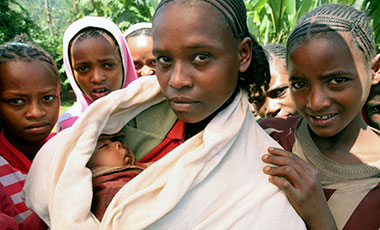On March 8, IFPRI joins individuals and organizations around the world in celebrating International Women’s Day. The theme this year, “Empowering Women, Empowering Humanity: Picture It!” urges us to both celebrate connections between women and community empowerment and to envision new ways to advance the rights of women. This year, International Women’s Day marks 20 years since 189 governments agreed on a roadmap to achieve gender equality with the Beijing Declaration and Platform for Action.
In the twenty years since the Beijing conference, IFPRI research has been actively shaping the “picture” of how to achieve gender equality. At times articulating a vision, at times challenging the conventional picture, new evidence from IFPRI has continually nudged forward agricultural development research, policy, and practice to empower women.
To celebrate International Women’s Day, we take a whirlwind tour of the evolution of IFPRI gender research. How did IFPRI help to cement women’s rights in rural development over the 20 years since the Beijing declaration?
It was not always the case that women were even in the picture in rural development. In 1995, Agnes Quisumbing represented IFPRI at Beijing and presented the early IFPRI work on women’s roles in food and nutrition security—as producers, income earners, and caregivers. This was one of the first times that quantitative evidence on women’s roles in food security was presented—and the audience was hungry for it. “People came up to me afterwards, saying that it was important that this new research was being produced, providing the numbers,” Quisumbing said.
Early IFPRI gender research helped produce evidence to reject a model of “unitary” household behavior, demonstrating that women and men within the same household do not necessarily have the same preferences, nor do they all pool their resources. This became a foundation of IFPRI gender research: Household members have varying levels of access and ownership over assets, and the relative differences in asset control are associated with differences in power within the household. The kinds of decisions that a household ends up making, in terms of what it produces and consumes, are products of these gendered power dynamics.
Could we see different kinds of decisions when women have more decisionmaking power? Surely. Subsequent IFPRI research investigated how improving women’s status can have positive effects on child health, nutrition, and agricultural productivity. The book Household Decisions, Gender, and Development synthesizes evidence from IFPRI gender research in the 1990s on how reducing gender gaps can contribute to improved food security, health, and nutrition in developing countries.
Reducing gender gaps necessitated recognition of women’s contributions to agriculture and natural resource management. Research from IFPRI brought attention to the importance of gender dynamics in agricultural research, development, and extension and rural service delivery and governance for food security and sustainable resource management. IFPRI research contributed to FAO’s State of Food and Agriculture 2010-2011 report as well as the 2014 publication Gender in Agriculture: Closing the Knowledge Gap, which both summarize the state of women’s contributions to agriculture and their obstacles to broader participation.
Increasing women’s use, control, and ownership of resources is a complex endeavor. IFPRI helped fill out the picture with the Gender, Agriculture, and Assets Project, which examines how men’s and women’s use, ownership, and control of assets affect how they can participate in and benefit from agricultural development projects. Designed and implemented properly, agricultural development projects can empower women.
Picturing women’s empowerment required defining and measuring it. The Women’s Empowerment in Agriculture Index (WEAI) is the first comprehensive and standardized measure to directly capture women’s empowerment, agency, and inclusion in the agricultural sector.
The role of women in agriculture and in their communities will continue to evolve in response to shifting dynamics in the agricultural sector. They are already important actors in adapting to climate change, and innovative group-based approaches can help improve women’s capacity for risk management by safeguarding their control over critical assets.
Finally, in addition to evidence, IFPRI is committed to sharing resources on gender research methods and building a community of practice on gender and rural development. Several blogs focus on improving data collection and disseminating best practices in women’s empowerment in agriculture, including the Gender and Food Policy Blog, Gender-Nutrition Idea Exchange, EnGendering Data, and the Climate Change, Collective Action, and Women’s Assets Blog, because the more people we have contributing to refining the picture on women’s rights, the clearer the picture becomes. We build momentum based on evidence and experience to bring this picture into practice.







